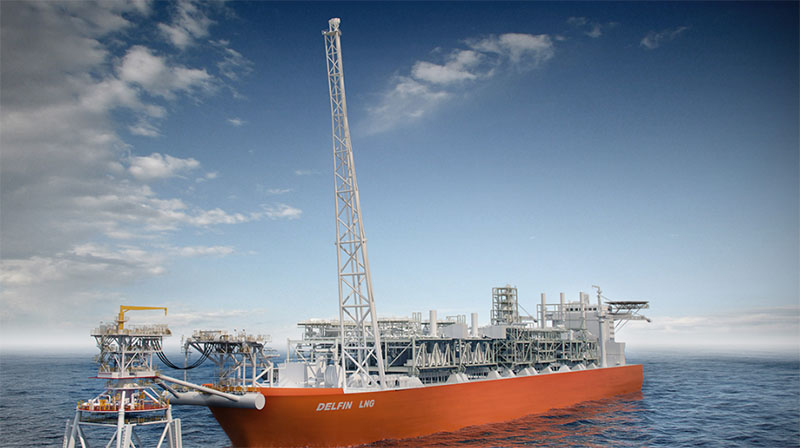Energy veteran betting on LNG bounce believes floating liquefaction is the way forward
(Bloomberg) — Turmoil in the oil market gave Fred Jones his start in the energy business four decades ago. Now he’ll be hoping turmoil in the gas market doesn’t sour his new venture.
Jones, who in 1974 helped found the trading firm that became Glencore Plc, is now chief executive officer of Delfin LNG LLC, which has applied to build the first modern floating natural gas liquefaction plant in the U.S. He’s doing so at a time when new export projects are primed to flood the market, slashing spot prices and making buyers less interested in signing long-term contracts that underpin ventures like his.
“History suggests that when the tide turns in a commodity market, it turns much harder and faster than everyone expects,” Jones said in an interview in Singapore. “We are already seeing the seeds of this rebalance sown with potential supply projects abandoning their development plans and new demand centers being created amidst today’s low-price environment.”
Jones expects the rebalance to occur in the early 2020s, when his new venture, Delfin, would come online. Jones plans to build four floating liquefaction vessels, known as FLNGs, and moor them about 50 miles south of Louisiana, where they will receive shale gas piped from the shore. The company expects approval early next year for a deepwater port license from the U.S. Coast Guard and Maritime Administration, he said.
Marc Rich
Jones, a native of New Zealand, moved to London in the early 1970s and started chartering ships for commodities trading powerhouse Phillip Brothers. At the time, Marc Rich was leading the firm into crude trading after the Arab oil embargo caused prices to soar and left U.S. refineries searching for supplies.
Rich and fellow trader Pincus Green left Phibro over a pay dispute in 1973. Jones said he called Rich to tell him he was interested in whatever his next venture would be, and Rich invited him to join on the spot. Rich, Green, Jones and two secretaries started March Rich + Co. in 1974. The firm became Glencore Plc in 1994, several years after Jones had already left. Two former colleagues confirmed Jones’s account. Glencore declined to comment.
Funding and Floating
Enbridge Inc. has purchased a 5% interest in Delfin, and the Korean Development Bank recently agreed to provide $1.5 billion in financing to the project. Jones said lenders are more comfortable funding floating liquefaction plants like his project because they can be moved if market conditions change and liquefaction at the original location is no longer profitable.
With the market over-supplied, only projects at the low end of the cost curve with well-funded partnerships that can handle price risk will move forward, Sanford C. Bernstein & Co. analysts including Neil Beveridge said in a July 8 research report.
Many investors don’t see FLNGs as a proven technology, according to Rafael McDonald, the Cambridge, Massachusetts-based global director of gas and LNG for IHS Inc. The first modern FLNG left a South Korean shipyard in May and is expected to begin producing from offshore Malaysia for Petroliam Nasional Bhd later this year. Many lenders want to see FLNGs perform for a few years before they’ll feel comfortable, he said.
“I have not heard of a great level of comfort emanating from the broader financing community,” McDonald said by e-mail. “The flip side, of course, is that for project developers, you don’t need all financiers to be comfortable with the concept. You only need enough to fund your project.”
Bloomberg News by Dan Murtaugh




